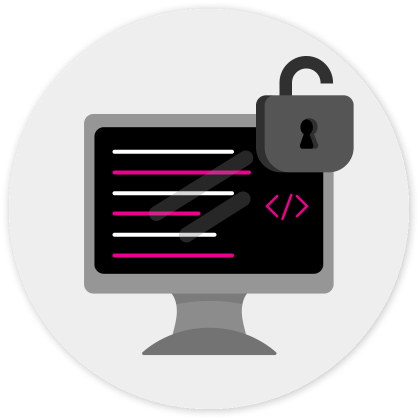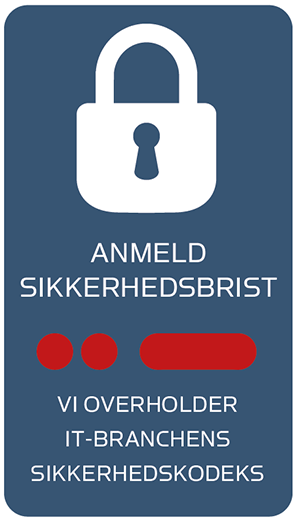About Magenta
We have worked with open source technologies since 1999
Magenta delivers software products in Denmark, Greenland, and Scandinavia. We develop solutions for cybersecurity and compliance that help businesses and organizations manage data and support information security. We provide our customers with development, operation, consulting, and maintenance of solutions, whether they choose cloud or on-premise. Our clients include a wide range of public institutions such as municipalities and regions, as well as some private customers.
Magenta delivers software products in Denmark, Greenland, and Scandinavia. We develop solutions for cybersecurity and compliance that help businesses and organizations manage data and support information security. We provide our customers with development, operation, consulting, and maintenance of solutions, whether they choose cloud or on-premise. Our clients include a wide range of public institutions such as municipalities and regions, as well as some private customers.
- Offices in Copenhagen, Aarhus and Nuuk
- 40 employees
- We deliver open source – and only open source
- Supplier of the SKI agreement for the Danish state, regions and municipalities.
Services
Implementation, advice and support
Deliverables from Magenta are always licensed under a OSI -approved open source license. At Magenta, we have extensive experience working in open source communities.
“
At our developer days, which are held 2-3 times a year, data protection and contingency plans are fixed points. They are also an integral part of the checklists we use at the beginning of a project.”
Sarah Nørgaard Magnusson, Koordinator og marktingchef
Contact
- +45 3336 9696
- info@magenta.dk
Open source

Why open source?
Open source is simply a very effective way to develop it solutions. With access to the source code, many can collaborate on the same code without worrying about what to hide and what to show. Linus Torvalds, the man behind the most widely used open source system in the world, Linux, has put it this way: “With enough eyeballs, all bugs are shallow.” The more people who can review an open source solution, the greater the likelihood that a security vulnerability will be discovered and fixed quickly.
Open source is well on its way to becoming big business. Thousands of companies are adopting the business model and delivering open and flexible programs and systems.
Customers save money on open systems, and in a few years, we will probably look back and ask ourselves and each other why we tolerated a business model where we couldn’t share and had to pay for the same thing over and over again.


Is open source secure?
We often hear the prejudice that access to the source code would make a product easier to hack. Access to the source code may indeed reveal the most obvious and trivial security holes, but only if they actually exist—and only if the rest of the infrastructure is not properly secured. Open source strengthens the ability to proactively address security holes, making them faster to fix.
How do we work with open source?
We have worked with security for many years. Our method is as simple as it is effective: No one can add code to a solution without at least one other colleague thoroughly reviewing the code. And often, two or three colleagues participate in the development through reviews, tests, and release processes.
In combination with our ISO certifications, it provides a working method that ensures knowledge sharing, transparency, and quick error detection and correction. In connection with the ISO certification, auditors focused on our culture and ability to keep the business running—both for our customers and ourselves.
Our team
Magentas employees
At Magenta we are often looking for new colleagues with exciting skills in software development as well as UX and project management.

Alex Thirifays

Alexander Faithfull

Anders Mølløw

Andreas Brodersen

Andreas Kring

Andreas Poulsen

Asbjørn Lind

Benjamin Lyng Jørgensen

Bent Handberg

Camilla Kinch

Carl Bordum

Caroline Dörner Carlsen

Carsten Agger

Casper V. Kristensen

Dea Lund Thisgaard

Emil Madsen

Erna Holst Rokne

Heini Leander Ovason

Ib-Michael Martinsen

Jesper Dam Gynther Knudgaard

Jonas Kofoed Hansen

Jonatan Nørgaard Pedersen

Kirstine Wulff Nielsen

Lars Peter Thomsen

Louis Nordsø

Mads Riis-Weitling

Maja Lopdrup

Marcus Funch

Maria Gilda Santos Andersen

Michelle Horstbøll

Miklas Bøgvald

Morten Kjærsgaard

Nick Janssen

Nikolaj Sievertsen Nørring

Nis Bornø

Peter Juelsgaard

Reidun Jakobsen

Sabrina Sørensen

Sarah Nørgaard Magnusson

Sebastian Heiberg

Stan Teerlynck

Thor Astrup Pedersen

Tim Engel

We believe that the quality of our products is an important parameter to compete in the highly competitive municipal market, and we know that our reputation is a crucial asset. And then we only charge for our services – not for user licenses or forced updates. This builds trust, provides a better customer experience, and we have learned that it also brings loyal customers. “
Morten Kjærsgaard
CEO, Magenta
Magenta has created an archive of tutorials and articles on useful open source tools that our developers use in everyday life or have tested for more specific customer solutions.
The first tutorial is about performance testing with the open source tool JMeter. The material was created by Andreas Kring, who presented JMeter at one of Magenta’s developer days. The material is divided into 3 exercises that deal with many of the basic configuration options for JMeter.



